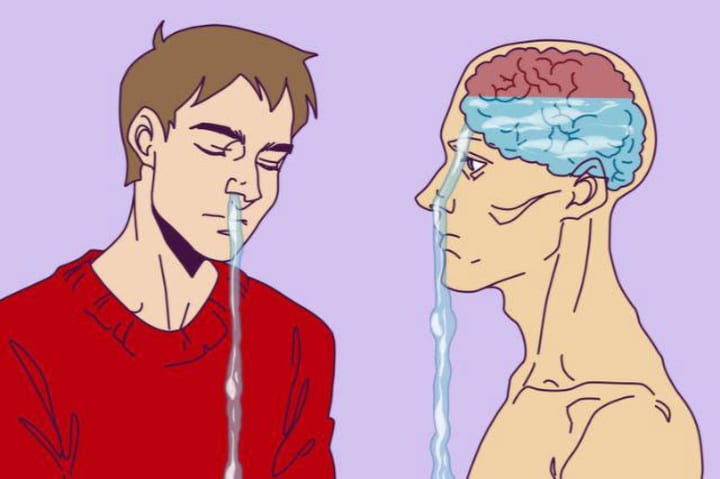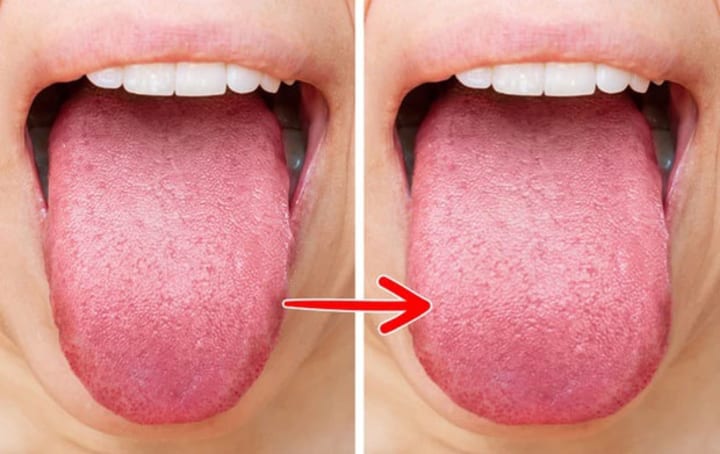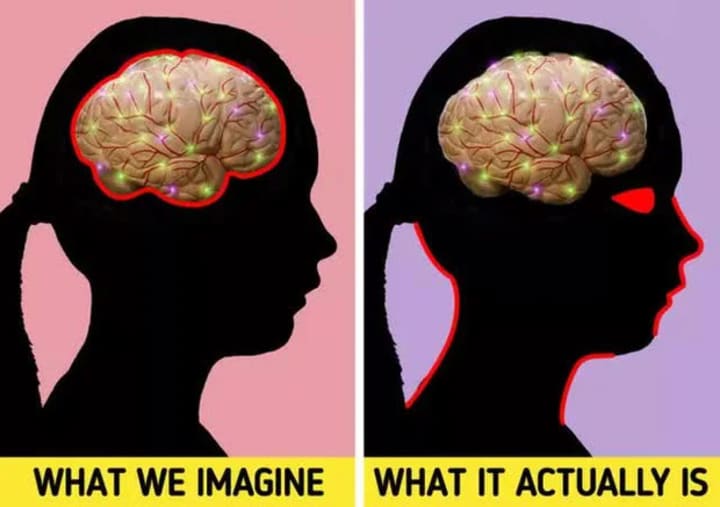Interesting facts about the human body
The human body is one of the most perfect "machines". There are 125,000 hairs on each person's head, on average each person laughs 15 times a day, you cannot sneeze without closing your eyes... these are interesting facts about the human body that many people do not know. .

The human body is one of the most perfect "machines". There are 125,000 hairs on each person's head, on average each person laughs 15 times a day, you cannot sneeze without closing your eyes... these are interesting facts about the human body that many people do not know. .
Totaldui website statistics interesting findings about the human body as follows:
1. The average person laughs 15 times a day.
2. You cannot sneeze without closing your eyes.
Sneeze
3. The strongest muscle in the body is the tongue.
4. Women blink almost twice as often as men.
5. You cannot commit suicide by holding your breath.
6. You can't lick your own elbow.
Tongue vein
7. Like fingerprints, each person's tongue print is different and unique.
8. If you sneeze too hard, you can break a rib.
9. If you try to keep from sneezing, you can rupture a blood vessel in your head or neck and die.
10. The average person eats more than 27 tons of food during their lifetime.
11. The average person spends 24 years of their life sleeping.
12. The average woman eats more than 6 pounds of lipstick in her lifetime. Even though she doesn't mean to.

13. Sitting and talking on the phone for 8 hours will burn 914 calories. Driving for 8 hours will burn 1,219 calories. While standing in a casino for 8 hours will burn 1,402 calories.
14. The most popular name in the world is Mohammed.
15. Right-handed people usually use the left side of their brain for all conscious and voluntary activities.
16. Most dust in the house comes from dead skin.
17. If combined, the total skin of each person weighs 2kg.
18. When upset, people need 42 facial muscles to express anger.
19. 10% of the population on Earth is left-handed.

20. There are a total of 125,000 hairs on each person's head.
21. Every 4 months, red blood cells in the blood travel a distance of 1,600 km.
22. In a lifetime, a person breathes 38,000 cm 3 of air.
23. Every second in the human brain about 100,000 chemical reactions take place.
24. The brain needs 0.05 seconds to recognize what the eye has just observed.
25. Humans can only survive 10 days without sleep, while they can survive several weeks without food.
26. Normal exhalation moves at a speed of 24km/h, while when sneezing it reaches a speed of 1,030km/h.
27. A human can “feed” up to a million mosquitoes! Each human body has enough blood to feed 1.2 to 1.8 million mosquitoes. A mosquito drinks about 0.003 ml of blood in one bite, so it would take an entire “bloodthirsty army” to drain a human body.
28. Men's breasts can also produce milk: Everyone - regardless of gender - has milk glands, milk ducts and nipples. Therefore, men's breasts can also produce milk if stimulated. Hormonal imbalance, severe stress, etc. are some of the causes that stimulate milk production in men.

29. A woman can give birth to more than 40 children: Due to genetics, some women are capable of giving birth and raising dozens of children. The record for “great mother” is held by an 18th century Russian woman who is said to have given birth to 69 children during her lifetime.
30. Facial hair grows the fastest on the body: If you ask any man, they will definitely agree that facial hair grows incredibly fast. Every day they have to shave their beards because they grow continuously. Perhaps this sometimes becomes an advantage for men when women are often attracted to beards.
31. Women's fingerprints are 99% different from men's: Women's skin secretes twice as many amino acids as men, and they are especially different in the finger area. That's why scientists can determine a person's gender thanks to fingerprints.
32. The way hands are clasped shows the dominance of each hemisphere of the brain: If when clasping hands, the right finger is on top, it means the right hemisphere is dominant. On the contrary, if the left finger is on top, it shows that the left hemisphere of the brain is more active. The right hemisphere is responsible for emotions and imagination, while the left hemisphere is used for thinking, analysis and logic. 1% of the population places their fingers parallel to each other. People with this habit are ambidextrous. Scientists agree that for ambidextrous people, neither hemisphere is completely dominant. Their brains will develop equally.
33. Runny nose could be fluid from the brain: Fluid leaking through the nose could be fluid in your brain. Cerebral fluid lies around the brain and is held by a special membrane. Sometimes it may leak a small amount down your nose as a clear liquid.

34. Everyone is unique: Let alone thinking, just the way you look is enough to make you unique. The shape of your ears, the shape and texture of your tongue are things that never change and are unique to you (fingerprints can change).
35. Women's hearts beat faster: Scientists from Canada have revealed that women's heartbeats are about 1.7 to 2.3 hours faster than men's. On average, a woman's heart beats 10 beats per minute.
36. The liver has more than 500 functions: Sometimes our liver is compared to a hard-working honey bee. Because they're doing everything constantly, from filtering blood, breaking down and absorbing fat, to metabolizing cholesterol and vitamins, and much more.
Liver function
37. A person can lie like a rock if they are in the bathroom: Yes, when you are in the bathroom, your ability to lie is pushed to the peak. The strong desire to “relieve” makes us focus on self-control, which makes the lie more convincing. Besides, they also limit any other movements when they are in the bathroom.
38. And if you're wondering what the heart smells like, it smells like mushrooms , according to a cardiac anesthesiologist.
39. When performing surgery, doctors sometimes have to remove some internal organs, but when they are replaced, they do not need to be put back in the exact position. That means your body is capable of moving the organs into the right place on its own, after surgery.
40. People who live in "harsh" conditions for many generations will adapt themselves in extreme ways . For example, people who live at high altitudes often have larger lungs and different blood composition. Or the Bajau people, who live their daily lives on the water and spend a lot of time diving, have evolved their spleen to become up to 50% larger, to be able to store more blood.
41. On average, humans have as much body hair as chimpanzees. But human hair is much shorter and finer.
42 . Your eyes have a separate immune system from the rest of your body, and in many cases, if your body's immune system "finds" your eyes, it will assume it is a foreign object and make you blind.
43. Humans can bioluminescent and glow in the dark , but the light we emit is 1,000 times weaker than the human eye's ability to receive. So we cannot recognize this luminescence.
44. The reason your collarbone breaks so easily is because it's designed to break. The way it exists is like a circuit breaker. It breaks in that position to prevent the shock of the impact from reaching your spine, and causing worse conditions.
45. The eyeball is the fastest healing part of your body.
forty six . You can calm yourself down by splashing cold water on your face , as that action activates the mammal's diving reflex.
47. Humans are one of the few mammals that do not produce their own vitamin C due to a deficiency of certain enzymes. Other mammals that exhibit this mutation include those in the major primate suborder Haplorhinni (monkeys, apes, tapirs), as well as bats and guinea pigs. All other mammals produce vitamin C in their livers.
48. The fastest thing that can grow new after being lost on a human body is toenails .

49. The surface area of the lungs is about the size of a tennis court.
50. 39% of people have extra bone in their knees. 100 years ago, only 11% of people had this bone.
51. Your Tongue Can Get Fat : When we gain weight, we not only gain fat around our waist, face, and stomach, but also on our tongue. In some cases, an oversized tongue can lead to obstructive sleep apnea. The good news is that your tongue can also get thinner as you lose body fat.

52. The longer your fingers, the more testosterone you have : The ratio of the length of your index finger to your ring finger is directly related to the amount of testosterone in your body. If your ring finger is longer, you have high levels of testosterone. Women with short index fingers are likely to be stronger due to exposure to higher levels of testosterone in the womb.
53. Stomach acid is very strong, it can burn a hole in the body if there is no protective membrane: We have a special mucosal layer that helps protect the stomach from the effects of acid. However, sometimes you may still experience a burning sensation due to acid reflux or heartburn. The worst case is when the digestive system does not work well, leading to stomach ulcers.
54. We secrete 1-2 liters of saliva every day : At certain times, we secrete more saliva than usual due to various factors. However, almost everyone secretes approximately the same total amount of saliva every day.
55. Our brain does not feel pain : The brain only alerts us to injury or damage and cannot feel pain because it does not have special receptors. So when we have a headache, the scalp, neck, sinuses, eyes, etc. will identify the pain. That is why neurosurgical operations can be performed while the patient is awake.

56. The immune system doesn't know we have eyes : Our eyes have a special "immune privilege". Therefore, the eyes can protect vital organs from being destroyed by the immune system. It prevents swelling and tissue changes, thus protecting our vision. That's why eye research and therapy is quite easy compared to other parts, because the immune system doesn't reject anything.
57. Humans can shine, we just can't see it : The saying "You can shine" is literally true. The intensity of light emitted by our bodies is 1,000 times lower than the sensitivity of our eyes. However, we can see our own aura with the help of especially sensitive cameras. Our brightest spots are the forehead, neck and cheeks and they are brightest in the late afternoon.
58. We have different kneecaps until we are 3-5 years old: Most people think that babies are born without kneecaps. The truth is that they do have kneecaps, but the material is a little different. A baby's kneecap is made entirely of cartilage. As they get older, the kneecap becomes harder.
About the Creator
HK Decor
Telling stories my heart needs to tell <3 life is a journey, not a competition
If you like what you read, feel free to leave a tip,I would love some feedback
https://sites.google.com/view/hk-decor/trang-ch%E1%BB%A7
Enjoyed the story? Support the Creator.
Subscribe for free to receive all their stories in your feed. You could also pledge your support or give them a one-off tip, letting them know you appreciate their work.






Comments
There are no comments for this story
Be the first to respond and start the conversation.